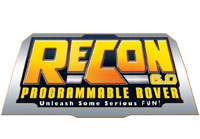Begin with 'Mission 1' (Basic Field Maneuvering) on Page 8 of the Owner's Manual.
Complete the first 5 missions from the Owner's Manual.
After you complete each one, you need to record a quick video on your video camera. At the beginning of each video, one of the group members will state what the Recon Rover is supposed to do and then you will record the rover doing just that. If it does not work properly, then you will need to push the stop button on the camera, delete the video, figure out what went wrong and then try again. Once you have successfully documented the mission, you can move on to the next one.
Complete the first 5 missions from the Owner's Manual.
After you complete each one, you need to record a quick video on your video camera. At the beginning of each video, one of the group members will state what the Recon Rover is supposed to do and then you will record the rover doing just that. If it does not work properly, then you will need to push the stop button on the camera, delete the video, figure out what went wrong and then try again. Once you have successfully documented the mission, you can move on to the next one.


